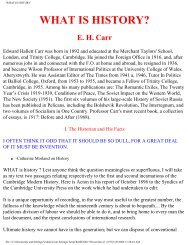The bronze age and the Celtic world - Universal History Library
The bronze age and the Celtic world - Universal History Library
The bronze age and the Celtic world - Universal History Library
You also want an ePaper? Increase the reach of your titles
YUMPU automatically turns print PDFs into web optimized ePapers that Google loves.
148<br />
THE BRONZE AGE AND THE CELTIC WORLD<br />
ago Dr. Tomaschek collected toge<strong>the</strong>r, from Greek <strong>and</strong> Latin sources, all <strong>the</strong> words<br />
which might be considered as belonging to this group, but most of <strong>the</strong>se are place-names<br />
or names of plants. This is not very satisfactory material for our purpose, for place-names<br />
may have been inherited from <strong>the</strong> previous inhabitants, while names of plants may be<br />
loan words. Fur<strong>the</strong>r than this most of <strong>the</strong> words have been preserved by Greek<br />
writers, <strong>and</strong> <strong>the</strong>re is no Q in <strong>the</strong> Greek langu<strong>age</strong>. Still I have thought it well to search<br />
through <strong>the</strong> hsts compiled by Tomaschek, <strong>and</strong> though <strong>the</strong> result is, perhaps, not very<br />
convincing, <strong>the</strong> presence of such words as Kavapos, Ktvdos, Quimedava or KovifieSa^a,<br />
Coila or Cuila, KepKivn, <strong>and</strong> several o<strong>the</strong>rs certainly hints that <strong>the</strong> Thraco-Phrygian<br />
tongues may have been Q dialects."<br />
<strong>The</strong> arguments from <strong>the</strong> east, while <strong>the</strong>y do not in any way contradict our<br />
equation, <strong>and</strong> may even be said to give it some support, are not quite decisive ; at<br />
any rate something more conclusive is desirable. It is useless to look for this in <strong>the</strong> west,<br />
in <strong>Celtic</strong> l<strong>and</strong>s, for our documentary evidence scarcely antedates <strong>the</strong> time of Juhus<br />
Caesar, or, at any rate, such earlier evidence as we possess is both meagre <strong>and</strong> uncertain.<br />
Finally all <strong>the</strong> evidence has been <strong>the</strong> subject of dispute, on almost every item differences<br />
of opinion have been expressed, <strong>and</strong> we have no sure or unquestioned data on which to<br />
depend. <strong>The</strong> controversy has also, unhappily, become associated with o<strong>the</strong>r differences<br />
of opinion.<br />
It will be well, <strong>the</strong>n, to leave for a time <strong>the</strong> consideration of <strong>the</strong> <strong>Celtic</strong> evidence,<br />
<strong>and</strong> to endeavour to test our equation without reference to <strong>the</strong> linguistic data of <strong>the</strong> west.<br />
<strong>The</strong>re remains, <strong>the</strong>n, only one o<strong>the</strong>r area in which to search for our confirmatory test,<br />
<strong>the</strong> Italian peninsula.<br />
Professor Conway" has given us to underst<strong>and</strong> that <strong>the</strong> Osco-Umbrian dialects,<br />
which were P langu<strong>age</strong>s, were spoken throughout Italy from Umbria southwards, <strong>and</strong><br />
doubtless, if we may judge from <strong>the</strong> statement of Herodotus already quoted, as far north<br />
as <strong>the</strong> foot-hiUs of <strong>the</strong> Alps, before <strong>the</strong> Gauls had invaded <strong>the</strong> valley of <strong>the</strong> Po. <strong>The</strong><br />
only exceptions to this spread of <strong>the</strong>se dialects were Etruria, or <strong>the</strong> greater portion of it,<br />
<strong>and</strong> a part of Latium, in which Latin dialects of <strong>the</strong> Q type were spoken. <strong>The</strong>se Latin<br />
dialects, Conway tells us, were spoken by <strong>the</strong> Latini, <strong>the</strong> Marsi, <strong>the</strong> ^Equi, <strong>the</strong> Hernici,<br />
" Tomaschek (1894).<br />
" Conway {1897).







